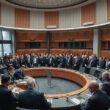A new report from the Institute for Social Cohesion (FGZ) has illuminated a complex and potentially pivotal shift in German public opinion regarding climate action. While a vast majority of citizens express a readiness to embrace ecological transformation, anxieties surrounding the societal and economic repercussions are pervasive, revealing a critical juncture for policymakers striving to enact meaningful change.
The study underscores a disconnect between acknowledging the urgency of the climate crisis – 83% of respondents expressed concern about the consequences of climate change – and supporting policies that might disrupt established economic structures. A significant 71% believe current government action is insufficient, yet 49% fear job losses resulting from climate policies, with 42% voicing concerns about a decline in their standard of living.
Researchers categorized the population into five distinct groups. A core of “Decided” (18%) champions comprehensive action, while a smaller, “Rejecting” faction (8%) actively criticizes climate policy and amplifies fears of economic fallout. The crucial group, however, are the “Concerned” (18%), who share the environmental awareness of the “Decided” but harbor the economic anxieties of the “Rejecting”. This cohort, representing a vital swing vote, will be key to successful implementation of climate strategy.
The FGZ report identifies the ‘Concerned’ as a group that could be mobilized to support the transition, but only if their social anxieties are explicitly addressed. A compelling 53% of respondents believe a fundamental restructuring of the economic system is necessary to effectively combat climate change, a sentiment particularly strong among the “Decided” and “Concerned”. A shared demand for redistribution and social equity ties these groups together, highlighting a desire for policies that mitigate potential economic hardship.
Furthermore, the study flags the political activism of the 8% “Rejecting” faction. This group is actively disseminating their views and often misinformation through social media channels. This activity, researchers suggest, contributes significantly to the wider perception that climate policy exacerbates societal divisions, with 70% expressing this fear. As Olaf Groh-Samberg, FGZ Director, observed, “If the attitude of the Rejecting is perceived as widespread, ambitious climate policy appears as a threat to social cohesion.
This finding poses a tangible challenge to policymakers: demonstrating that the necessary transition towards a green economy will not disproportionately affect vulnerable populations and proactively debunking the narratives propagated by opposition groups. The study suggests that a focus on equitable outcomes and transparent communication may be paramount in navigating this complex political landscape and securing broad public support for the ecological transformation.





